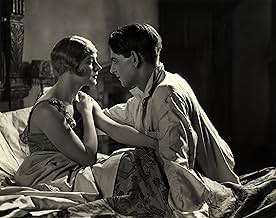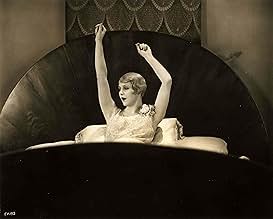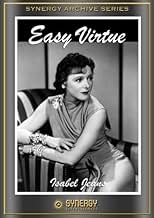NOTE IMDb
5,4/10
3,3 k
MA NOTE
Une femme récemment divorcée cache son passé scandaleux à son nouveau mari et à sa famille.Une femme récemment divorcée cache son passé scandaleux à son nouveau mari et à sa famille.Une femme récemment divorcée cache son passé scandaleux à son nouveau mari et à sa famille.
- Réalisation
- Scénario
- Casting principal
Enid Stamp-Taylor
- Sarah
- (as Enid Stamp Taylor)
Alfred Hitchcock
- Man with Stick Near Tennis Court
- (non crédité)
Benita Hume
- Telephone Receptionist
- (non crédité)
Ben Webster
- Justice Halstead
- (non crédité)
Avis à la une
Easy Virtue is one of Hitchcock's interesting but not great films, that is neither among his best or worst. Not a terrible one but this is really not the master of suspense at his best. When it comes to his silent films, Easy Virtue is perhaps one of his weaker ones, with his best being The Lodger and his weakest being Champagne. It has a lot of good things. There are some very clever shots and Hitchcockian touches like in the opening courtroom scene with everything being shot like from the perspective of the judge through his monocle and the proposal over the phone showing only the reactions of the telephone operator. Hitchcock directs very well, though there is understandably the sense that he was still finding and developing his own style. The sets and costumes are lovely to watch, while Violet Farebrother plays her role with tremendous gusto and Isabel Jeans brings a lot of charm to hers. Robin Irvine is very bland though and the rest of the acting can feel rather overheated and exaggerated even with a silent melodrama. The characters do come across as stock and somewhat cardboard, there's little dimension to them and you don't really care for them either. The story is a let down, it begins brilliant and ends just as satisfyingly but there's half-an-hour at least of tedious melodrama and staid storytelling, the romance also lacks passion and you don't ever really feel the love between them. And some have made a good point about the benefits of having dialogue instead here, I have great appreciation for silent films but Easy Virtue was the sort of film being a comedy-social drama where dialogue would have helped it come alive. Overall, not terrible, not great, mixed view here if anything. 5/10 Bethany Cox
"Virtue is its own reward," they say - but "Easy Virtue" is society's reward for a slandered reputation. In the prologue, director Alfred Hitchcock crosscuts courtroom drama with flashbacks... Attractive Isabel Jeans (as Larita) is in divorce court, after a scandalous incident results in the death of a painter for whom she was sitting. Her drunken husband interrupted artist Eric Bransby Williams (as Claude Robson) as he was making play for the modeling Ms. Jeans. The painter wounded brutish rival Franklin Dyall (as Aubrey Filton), before killing himself. Jeans gains nothing but her freedom at trial. But, she was named in the dead painter's will.
Notorious, Jeans goes for a vacation on the Mediterranean, intending to relax and stay away from men. Instead, she finds the latter when well-heeled bachelor Robin Irvine (as John Whittaker) hits her in the head with his ball while playing tennis. After apologizing, Mr. Irvine begins courting Jeans. "It was like a cool breeze sweeping away the ugly memories of the past." The two whirlwind themselves into man and wife. Then, Irvine brings Jeans home to live in the family mansion. There, matriarchal Violet Farebrother senses something lurid in her daughter-in-law's past. Will Jeans' sordid history ruin her chances for happiness?
But, of course.
"Easy Virtue" may be considered rather ordinary, albeit a Noel Coward play directed to film by Alfred Hitchcock. But, as a silent melodrama, it's not only above average, but a little innovative. The location and settings are very nice. Most of the featured players are held over Hitchcock's previous "Downhill" (1927). "Mother-in-law" Farebrother makes the bulk of the film interesting, as she endeavors to rid her son of his bride. Their witty exchanges were written by Eliot Stannard, not Mr. Coward, by the way. Farebrother has a pleasantly sharp tongue, asking, "John, who is this woman you have pitchforked into the family?" She shoots to kill.
****** Easy Virtue (3/5/28) Alfred Hitchcock ~ Isabel Jeans, Robin Irvine, Violet Farebrother, Ian Hunter
Notorious, Jeans goes for a vacation on the Mediterranean, intending to relax and stay away from men. Instead, she finds the latter when well-heeled bachelor Robin Irvine (as John Whittaker) hits her in the head with his ball while playing tennis. After apologizing, Mr. Irvine begins courting Jeans. "It was like a cool breeze sweeping away the ugly memories of the past." The two whirlwind themselves into man and wife. Then, Irvine brings Jeans home to live in the family mansion. There, matriarchal Violet Farebrother senses something lurid in her daughter-in-law's past. Will Jeans' sordid history ruin her chances for happiness?
But, of course.
"Easy Virtue" may be considered rather ordinary, albeit a Noel Coward play directed to film by Alfred Hitchcock. But, as a silent melodrama, it's not only above average, but a little innovative. The location and settings are very nice. Most of the featured players are held over Hitchcock's previous "Downhill" (1927). "Mother-in-law" Farebrother makes the bulk of the film interesting, as she endeavors to rid her son of his bride. Their witty exchanges were written by Eliot Stannard, not Mr. Coward, by the way. Farebrother has a pleasantly sharp tongue, asking, "John, who is this woman you have pitchforked into the family?" She shoots to kill.
****** Easy Virtue (3/5/28) Alfred Hitchcock ~ Isabel Jeans, Robin Irvine, Violet Farebrother, Ian Hunter
In Alfred Hitchcock's Easy Virtue, a woman has some explaining to do when the family of her second husband finds out there was a first husband. That's because back in the day, divorced women were considered damaged goods, and upstanding families would steer well clear of such flighty harlots. Easy Virtue's tagline asks "Can she be blamed for a past she didn't create?" And the answer is yes, because she did create her past when she started making eyes at the man painting her portrait. But perhaps I am getting a little ahead of myself.
Larita Filton (Isabel Jeans) is married to an unnamed guy. Well, he probably has a name, but the movie doesn't tell us. Anyway, they're rich, and she's having her portrait done by a professional artist. One day the artist notices marks on Larita's wrist, and she mentions that her husband sometimes drinks too much. Thus a relationship is born, at least as far as they went in the 1920s, which meant it's possible Larita and the artist smooched once. Anyway, one fine day the husband comes home to find the two of them in an embrace. A gun is presented, and a shot is fired, and the artist dies. This is all told to us in flashback at the divorce trial, where the jury quite naturally finds in favor of the husband. Larita is shamed and shunned.
She finds herself chillaxing on the Mediterranean, and a chance encounter with a tennis ball leads Larita to meet John Whittaker (Robin Irvine), who's from a well-to-do family himself. They romance, yadda yadda, and soon they're wed. He brings her home to meet his parents and his two sisters for dinner. The stern matriarch is fairly sure she recognizes Larita, and eventually she pieces it together. Haughty hilarity ensues.
This is a silent film, obviously very early in The Master's career, and much more of a melodrama than a thriller with a twist. There's no twist, and because there are few sight gags one must rely on the intermittent title cards to follow the mouthed dialog. That's all well and good, but there was just too much predictability afoot, and the quality of the print did the movie no favors, either. That all makes Easy Virtue a curio in Hitch's long, long career, and little more.
Larita Filton (Isabel Jeans) is married to an unnamed guy. Well, he probably has a name, but the movie doesn't tell us. Anyway, they're rich, and she's having her portrait done by a professional artist. One day the artist notices marks on Larita's wrist, and she mentions that her husband sometimes drinks too much. Thus a relationship is born, at least as far as they went in the 1920s, which meant it's possible Larita and the artist smooched once. Anyway, one fine day the husband comes home to find the two of them in an embrace. A gun is presented, and a shot is fired, and the artist dies. This is all told to us in flashback at the divorce trial, where the jury quite naturally finds in favor of the husband. Larita is shamed and shunned.
She finds herself chillaxing on the Mediterranean, and a chance encounter with a tennis ball leads Larita to meet John Whittaker (Robin Irvine), who's from a well-to-do family himself. They romance, yadda yadda, and soon they're wed. He brings her home to meet his parents and his two sisters for dinner. The stern matriarch is fairly sure she recognizes Larita, and eventually she pieces it together. Haughty hilarity ensues.
This is a silent film, obviously very early in The Master's career, and much more of a melodrama than a thriller with a twist. There's no twist, and because there are few sight gags one must rely on the intermittent title cards to follow the mouthed dialog. That's all well and good, but there was just too much predictability afoot, and the quality of the print did the movie no favors, either. That all makes Easy Virtue a curio in Hitch's long, long career, and little more.
I occasionally watch a silent film.I do find it very frustrating when actors are mouthing words and we are expected to know what they are saying without benefit of intertwines. Byou far the best part of the film is the opening trial scene.After that it is all downhill and rather silly at that.Hitchin was capable of making stinkers egg Under Capricorn,and this was clearly one of them
This is my first Hitchcock silent film. this film grew on me as i watched it, i thought it started out slow . but slowly developed into something very interesting. i was upset that i missed Hitch's cameo.. he's a sneaky one. this is my 4th silent film that i have watched, and this one compares almost to the other ones, but the others are classics.. phantom, Dr Jekyll, and hunchback. so this one kinda had some unfair competition. like i said before it started slow, but it quickly engrossed me after the part where she goes to his parents house to meet the family.. i thought her character was unfairly judged by his family to the point where i was glad she didn't marry him, i admired her character for standing up to the mother in that one,, what s really awful mother in law. without ruining the ending for those who haven't seen this early Hitchcock gem,, i loved the ending.
Le saviez-vous
- AnecdotesAlfred Hitchcock: Walking past a tennis court carrying a walking stick.
- GaffesWhile sitting with Larita after she is hit with the tennis ball, John's sitting position changes between shots.
- Citations
[last lines]
Larita Filton: [to news photographers] Shoot! There's nothing left to kill.
- Versions alternativesThere is an Italian edition of this film on DVD, distributed by DNA Srl: "SOTTO IL CAPRICORNO (Il peccato di Lady Considine, 1949) New Widescreen Edition + FRAGILE VIRTÙ (1927)" (2 Films on a single DVD, with "Under Capricorn" in double version 1.33:1 and 1.78:1), re-edited with the contribution of film historian Riccardo Cusin. This version is also available for streaming on some platforms.
- ConnexionsFeatured in Hitchcock/Truffaut (2015)
Meilleurs choix
Connectez-vous pour évaluer et suivre la liste de favoris afin de recevoir des recommandations personnalisées
Détails
- Durée
- 1h 20min(80 min)
- Mixage
- Rapport de forme
- 1.33 : 1
Contribuer à cette page
Suggérer une modification ou ajouter du contenu manquant


















